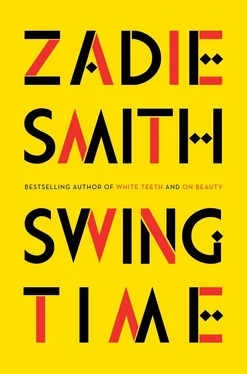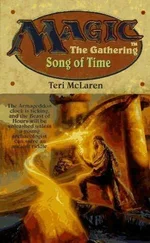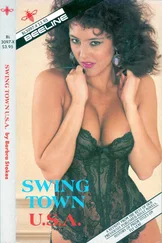Zadie Smith - Swing Time
Здесь есть возможность читать онлайн «Zadie Smith - Swing Time» весь текст электронной книги совершенно бесплатно (целиком полную версию без сокращений). В некоторых случаях можно слушать аудио, скачать через торрент в формате fb2 и присутствует краткое содержание. Город: NYC, Год выпуска: 2016, ISBN: 2016, Издательство: Penguin Publishing Group, Жанр: Современная проза, на английском языке. Описание произведения, (предисловие) а так же отзывы посетителей доступны на портале библиотеки ЛибКат.
- Название:Swing Time
- Автор:
- Издательство:Penguin Publishing Group
- Жанр:
- Год:2016
- Город:NYC
- ISBN:978-0-39956-431-4
- Рейтинг книги:4 / 5. Голосов: 1
-
Избранное:Добавить в избранное
- Отзывы:
-
Ваша оценка:
- 80
- 1
- 2
- 3
- 4
- 5
Swing Time: краткое содержание, описание и аннотация
Предлагаем к чтению аннотацию, описание, краткое содержание или предисловие (зависит от того, что написал сам автор книги «Swing Time»). Если вы не нашли необходимую информацию о книге — напишите в комментариях, мы постараемся отыскать её.
Dazzlingly energetic and deeply human,
is a story about friendship and music and stubborn roots, about how we are shaped by these things and how we can survive them. Moving from northwest London to West Africa, it is an exuberant dance to the music of time.
Swing Time — читать онлайн бесплатно полную книгу (весь текст) целиком
Ниже представлен текст книги, разбитый по страницам. Система сохранения места последней прочитанной страницы, позволяет с удобством читать онлайн бесплатно книгу «Swing Time», без необходимости каждый раз заново искать на чём Вы остановились. Поставьте закладку, и сможете в любой момент перейти на страницу, на которой закончили чтение.
Интервал:
Закладка:
When Tracey got home each day after school her flat was almost always empty. Who knew where her mother was? “Down the high road,” said my mother — this meant “drinking”—but I walked past the Sir Colin Campbell every day and never saw her in there. The times I did spot her she was usually in the street bending someone’s ear, often crying and dabbing at her eyes with a hanky, or else sitting at the bus stop on the other side of the estate wall, smoking, staring into space. Anything but sit in that tiny flat — and I didn’t blame her. Tracey by contrast very much liked to be home, she never wanted to go to the playground or to be in the streets. She kept a key in her pencil case, let herself in, went straight to the sofa and began watching the Australian soaps until the British ones started, a process which began at four p.m. and ended when the credits ran on Coronation Street. Somewhere in between she either got her own tea or her mother arrived with takeaway and joined her on the sofa. I dreamed of freedom like hers. When I got home either my mother or my father wanted to know “what had happened at school today,” they were very insistent about it, I wouldn’t be let alone until I told them something and so, naturally, I began lying to them. I thought of them at this point as two children, more innocent than me, whom it was my responsibility to protect from the kind of uncomfortable facts that they would either over-think (my mother) or over-feel (my father). That summer the problem became acute because the true answer to “How was school today?” was “There is a mania in the playground for grabbing vaginas.” Three boys from Tracey’s estate had initiated the game, but now everyone was playing, the Irish kids, the Greek kids, even Paul Barron, the completely Anglo-Saxon son of a policeman. It was like tag, but a girl was never “It,” only boys were “It,” girls simply ran and ran until we found ourselves cornered in some quiet spot, away from the eyes of dinner ladies and playground monitors, at which point our knickers were pulled aside and a little hand shot into our vaginas, we were roughly, frantically tickled, and then the boy ran away, and the whole thing started up again from the top. You could tell the popularity of a girl by who got chased longest and hardest. Tracey with her hysterical giggle — and deliberately slow run — was, as usual, number one. I, wanting to be popular, also sometimes ran slowly, and the awkward truth is I wanted to be caught — I liked the electricity that ran from my vagina to my ear even in anticipation of the hot little hand — but it is also true that when the hand actually appeared some reflex in me, some ingrained concept of self-preservation, inherited from my mother, always squeezed my legs together, and I tried to fight the hand, which was in the end always impossible. All I did was make myself even more unpopular by struggling for those first moments.
As to whether you wanted one boy or another boy to chase you, no, this wasn’t anybody’s concern. There was no hierarchy of desire because desire was a very weak, practically non-existent, element of the game. The important thing was that you were seen to be the kind of girl worth chasing. It was a game not of sex but of status — of power. We did not desire or dread the boys in themselves, we only desired and dreaded being wanted or not being wanted. An exception to this was the boy with terrible eczema, whom we all truly and sincerely dreaded, Tracey as much as anyone, because he left, in your knickers, little flecks of dead gray skin. When our game mutated from playground prank to classroom risk, the boy with eczema became my daily nightmare. Now the game went like this: a boy dropped a pencil on the floor, always at a moment when Mr. Sherman had his back to us and his eyes on the board. The boy crawled under the table to retrieve the pencil, came up to a girl’s crotch, pulled her knickers aside and stuck his fingers in, leaving them there for as long as he thought he could get away with. The random element was now gone: only the original three boys played and they only visited those girls who were both close to their own desks and whom they assumed would not complain. Tracey was one of these girls, as was I, and a girl from my corridor called Sasha Richards. The white girls — who had generally been included in the playground mania — were now mysteriously no longer included: it was as if they had never been involved in the first place. The boy with eczema sat one desk away from me. I hated those scaly fingers, I was horrified and disgusted by them, and yet, at the same time, could not help but take pleasure in that delightful and uncontrollable electricity rushing from my knickers to my ear. Of course, it wasn’t possible to describe such things to my parents. In fact this is the first time I have presented them in any way to anyone — even to myself.
Strange now to think that we were all only nine years old at the time. But I still look back on that period with a certain measure of gratitude for what I have come to see as my relative luck. It was the season of sex, yes, but it was also, in all the vital ways, without sex itself — and isn’t that one useful definition of a happy girlhood? I didn’t know or appreciate this aspect of my luck until well into adulthood, when I began to find, in more cases than I would have guessed, that among my women friends, irrespective of background, their own childhood sex seasons had been exploited and destroyed by the misdeeds of uncles and fathers, cousins, friends, strangers. I think of Aimee: abused at seven, raped at seventeen. And beyond personal luck, there is geographical and historical luck. What happened to the girls on the plantations — or in the Victorian workhouses? The closest I came to anything like that was the music store room and I did not come very close at all, and I have historical luck to thank for that, surely, but also Tracey, as it was she who came to my rescue, in her own peculiar way. It was a Friday at the end of the day, not long before school broke up for the year, and I’d gone to the store room to borrow some sheet music, it was for the song “We All Laughed,” which Astaire sang so simply and so well, and I meant to give it to Mr. Booth on Saturday morning, to help us sing it as a duet. Another piece of my luck was that Mr. Sherman, my class teacher, was also the school’s music teacher, and as keen on the old songs as I was: he had a filing cabinet full of Gershwin scores and Porter scores, and so on, kept here in the music cupboard, and on Fridays I was allowed to borrow what I wanted, to be returned on Monday. The space was typical of such schools at the time: chaotic, too small, windowless, many ceiling tiles missing. Old violin and cello cases were stacked up against one wall, and there were plastic tubs of descant recorders, full of saliva, their mouthpieces as chewed as dog toys. There were two pianos, one broken and covered in a dust sheet, one very out of tune, and many sets of African drums, for they were relatively cheap and anyone could play them. The overhead light didn’t work. You had to work out what you wanted while the door was still open, pinpoint its location, and then, if the item was not in arm’s reach, let the door shut and carry on in darkness. Mr. Sherman had told me he’d left the folder I needed on top of the gray filing cabinet in the far-left-hand corner, and I spotted the cabinet and let the door ease shut. The darkness was complete. I had the folder in my hand and my back to the door. A thin streak of light sliced the room for a few moments and disappeared. I turned — I felt hands on me. One pair of hands I recognized immediately — the boy with eczema — the other I soon understood belonged to this boy’s best friend, a lanky, uncoordinated child called Jordan who was mentally slow, easily led and sometimes dangerously impulsive, a set of symptoms which had, back then, no particular diagnosis, or none that Jordan and his mother were ever given. Jordan was in my class, but I never called him Jordan, I called him Spaz, everybody did, but if it was meant as an insult he had long ago defused it by answering to it cheerfully as if it were his name. His status in our class was peculiar: despite his condition, whatever it was, he was tall and handsome. While we looked like children, he looked like an adolescent, his arms had muscle in them and his hair was sharp, shaved on the sides in a real barber’s shop. He was no good at classwork, had no real friends, but he was a useful and passive sidekick for boys with nefarious plans, and was more often than not the focus of the teachers’ attention, the smallest interruption from him had a disproportionate effect, and this was interesting for the rest of us. Tracey could — did — tell a teacher to “fuck off” without even being sent to stand in the hall, but Jordan passed most of his time in that hall, for what seemed, to the rest of us, small infractions — talking back, or not removing a baseball cap — and after a while of this we began to understand that the teachers, especially the white women, were scared of him. We respected that: it seemed like a special thing, an achievement, to make a grown woman fear you, though you were only nine years old and mentally disabled. Personally I was on good terms with him: he had sometimes put his fingers in my knickers but I was never convinced he knew why he was doing it, and on the walk home, if we happened to fall in step, I sometimes sang for him — the theme tune to “Top Cat,” a cartoon with which he was obsessed — and this soothed and made him happy. He would walk along, head inclined toward me, making a low, gurgling sound like a contented baby. I did not think of him as an aggressor, yet here he was in the music cupboard, touching me everywhere, giggling in a manic way, following and imitating the more calculated laugh of the boy with eczema, and it was clear that this wasn’t the playground game or the classroom game, it was a new and perhaps dangerous escalation. The boy with eczema was laughing, and I was meant to laugh, everything was meant to be a kind of joke, but each time I tried to keep some item of clothing up, they pulled it down and I was meant to laugh at that, too. Then the laughing stopped and something urgent took over, they worked in silence, and I went silent myself. At that moment the thin streak of light reappeared. Tracey was at the door: I saw her in silhouette, framed in the light. She closed the door behind her. She didn’t say anything right away. She just stood with us in the dark, silent, not doing anything. The boys’ hands slowed down: it was the child’s version of sexual absurdity — familiar to adults — when something that appeared so urgent and all-consuming a moment before now suddenly seems (often in conjunction with a light going on) small and pointless, even tragic. I looked over at Tracey, still burned into my retina in relief form: I saw her outline, the retroussé nose, the perfectly divided plaits with their satin bows. At last she took a step back, opened the door wide and held it open.
Читать дальшеИнтервал:
Закладка:
Похожие книги на «Swing Time»
Представляем Вашему вниманию похожие книги на «Swing Time» списком для выбора. Мы отобрали схожую по названию и смыслу литературу в надежде предоставить читателям больше вариантов отыскать новые, интересные, ещё непрочитанные произведения.
Обсуждение, отзывы о книге «Swing Time» и просто собственные мнения читателей. Оставьте ваши комментарии, напишите, что Вы думаете о произведении, его смысле или главных героях. Укажите что конкретно понравилось, а что нет, и почему Вы так считаете.












